Commentary: Is South Korea doing enough to tackle its new COVID-19 wave?
Advertising
Commentary
Commentary: Is Republic of korea doing enough to tackle its new COVID-19 moving ridge?
The scary thing almost the outbreak in Republic of korea at present is that unlike the previous two waves, this time there is no discernible epicentre, says Steven Borowiec.
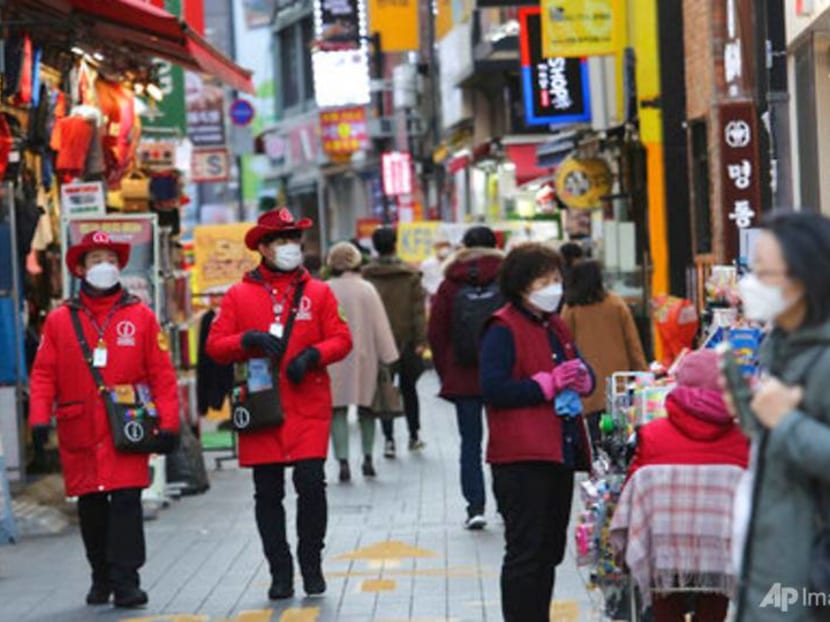
Tourist data helpers wearing face masks walk along a popular shopping street in Seoul, Republic of korea, Wednesday, December. ii, 2020. (AP Photo/Ahn Young-joon)
03 Dec 2022 06:14AM (Updated: 29 Jan 2022 04:16PM)
SEOUL: The current wave of coronavirus infections in Republic of korea is dissimilar annihilation the country has faced in its near yr-long battle against COVID-nineteen.
The first wave, in February, was concentrated in Daegu, a metropolis in the due south, by and large involving members of a fringe religious sect. After Daegu was cordoned off and the people exposed to the virus tracked downward and tested, the spread came under control.
When the virus spiked again in August, the outbreak was tied to members of a church who participated in a political rally in downtown Seoul.
READ: Commentary: Japan has taken care of two COVID-19 waves and then how bad can this third one be?
Again, public health authorities swarmed the affected areas, carried out tests and stopped the spread.
After both of those waves, the regime relaxed social distancing guidelines and declared that regular life would resume.
In early fall, Republic of korea was a global beacon of normalcy, as its popular baseball game league played out the season with fans in omnipresence, while on the commercial streets of Seoul, concern was slower than normal but nevertheless carried on.
ANOTHER OUTBREAK
That all could be at chance now, as throughout November, the country has reported hundreds of new cases per twenty-four hour period, numbers that are far lower than in coronavirus hotspots like the United states and Brazil, only much higher than before this yr, when Southward Korean cases were downwardly to a few dozen per day.
The scary thing nearly the outbreak now is that different those previous two waves, this time there is no discernible epicentre. On the weekend, the majority of cases were reported in Seoul, along with outbreaks in the southern city of Busan, as well as Gangwon Province, a mountainous expanse in the land's northwest.
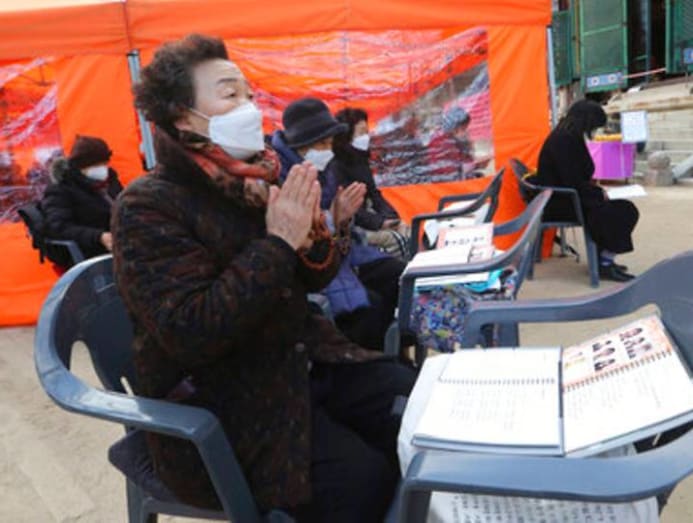
Every 24-hour interval when public health authorities announce the number of new infections and their sources, they mention a wide range of places: Nursing homes, saunas, workplaces. Fifty-fifty a table-tennis club in Seoul became a hotspot.
Even with hand sanitisers in every public place and temperature checks at every entrance, COVID-xix carriers could be in whatsoever public identify. That around xxx per cent of infected people never show symptoms merely can transmit the virus makes COVID-19 difficult to contain.
THIS Time IT ISN'T Independent
South Korean Wellness Minister Park Neunghoo distilled the unpredictability of the situation when he said, "Nosotros're in a situation where it is non strange at all if anyone contracts the virus during our daily lives."
READ: Commentary: Lessons from around the earth on fighting new COVID-xix waves
Park's remarks also illustrate how, during the previous waves of infection, nigh South Koreans felt like as long as they weren't continued to the institutions at the center of the outbreak, they would probably be safe.
That feeling of relative containment is gone. Park and other officials are grappling with the reality that anybody is vulnerable, while seeking effective measures to stalk the spread of COVID-nineteen.
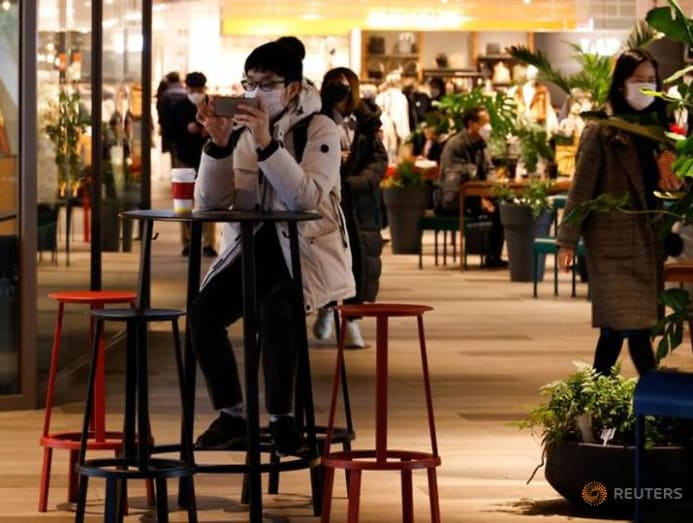
Officials have told the public to cancel year-end parties, an of import cultural institution in South Korea, where colleagues, friends and onetime classmates get together to consume, beverage and wish each other well.
Some such gatherings accept taken identify every twelvemonth for decades, and might be the only time of the year that those friends meet each other.
BALANCING HEALTH AND Economic RISKS
The government hither is as well caught betwixt the duelling needs to contain the virus and vitalise the economy.
Many restaurants and bars rely on the busy end-of-twelvemonth flavor for an outsized portion of their annual revenue, and the cancellation of parties will lead to layoffs and closures, afterward the service manufacture has already been decimated past the pandemic.
READ: Commentary: Guaranteed adjacent-day deliveries in Due south Korea are coming at a heavy price
On Sunday (Nov 29), the government declined to enhance the official level of social distancing in Seoul, despite the high numbers of cases, out of apparent consideration of the economy.
While successfully mitigating the spread of COVID-19, South korea has managed to avoid the strict lockdowns implemented in some countries; throughout the pandemic there has never been all-out closures of restaurants, confined or java shops.
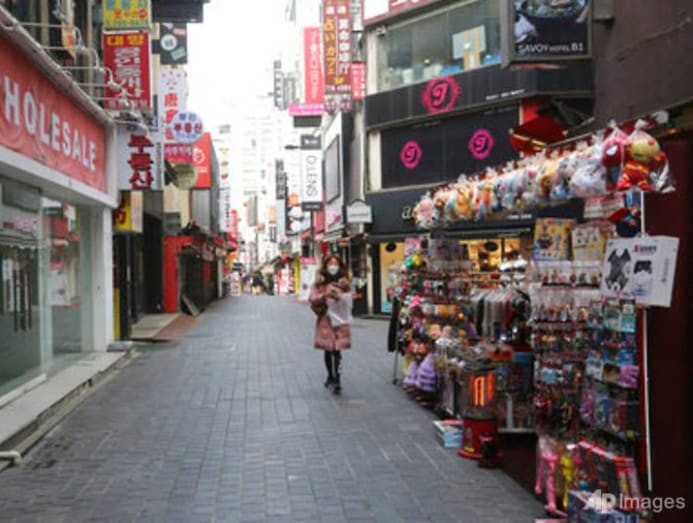
With people gathering more indoors due to the onset of common cold winter weather, the risk of spontaneous cluster infections volition continue.
Seoul likewise appear that anyone non wearing a mask in public would be subject to a fine of well-nigh The states$100, which came across besides-intentioned, merely maybe inconsequential, every bit pretty much everyone already wears a mask anyhow.
At that place is no conspicuously identifiable cause of the electric current spate of outbreaks.
Authorities HELD TO HIGH STANDARDS
Nevertheless, all the measures are indications that the government is trying.
A couple of weeks ago I had a chat with a Korean journalist who commented, "In that location are about 500 cases a day, and everyone is freaking out. In other countries there are thousands of cases every day."
His off-mitt comment gets at something important: The Southward Korean public demands action from its authorities.
This state has a vibrant culture of protest, and leaders who fail at their posts tin can expect organised movements to get them out of role and be replaced with someone who will do a better job.
Case in point, electric current President Moon Jae-in was elected after his predecessor was implicated in a corruption scandal and impeached.
I have written earlier near my belief that South Korea's memories of war in the 1950s and economic collapse in the tardily 1990s make this country extra assertive when information technology comes to addressing crises.
With those painful memories, no 1 wants to go back to the bad times.
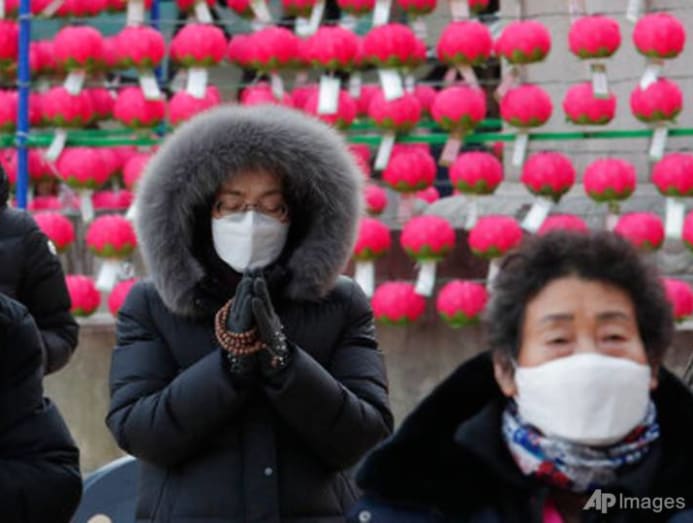
This civilisation of civic appointment is why I look the South Korean government to weather the coronavirus pandemic. Later on months of this pandemic that everyone is tired of, the authorities yet holds daily briefings, transparently sharing the details of new infections and measures taken to limit them.
The messaging from health government has been consequent: Avoid big gatherings, wash your easily and wear a mask.
Government DOING ITS Best
The South Korean government has, in its response to the pandemic, garnered criticism for not more firmly shutting off cross-border traffic with China and for at times oversharing the personal details of people who became sick.
READ: Commentary: BTS management'due south stock listing is a sign K-Pop is no passing fad
Moon incurred some justified consternation in February when he urged the public to restart "normal activities," right before the virus spread got out of control.
In light of all that, Republic of korea is not giving up, while standing to sharpen its pandemic response.
The government appears to be betting that the ongoing rise in the number of cases will be short-lived, and that a sure number of daily infections is a tough just adequate cost to pay in order to avert a total lockdown that would inflict widespread economic suffering.
The safest prediction is probably that, until a reliable COVID-19 vaccine is distributed, this blueprint of outbreak, followed past a lockdown, followed by an try to restart normal life and then another outbreak, will go along.
Despite the current wave, at that place is enough to show that the authorities takes the pandemic seriously and will continue all efforts to comprise it. At that place is little more one can inquire for.
Steven Borowiec is the politics editor of Korea Expose.

0 Response to "Commentary: Is South Korea doing enough to tackle its new COVID-19 wave?"
Enregistrer un commentaire